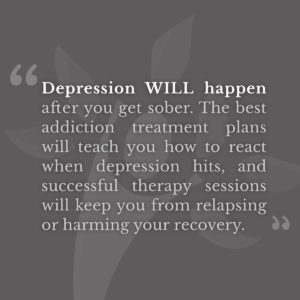
Countless Americans struggling with a substance use disorder understand the powerful connection between addiction and depression. In fact, it is estimated that 1 in 3 people suffering from clinical depression will turn to drugs or alcohol in a desperate attempt at self-medication. While drugs and alcohol may be effective in blocking out the painful symptoms of depression in the short term, substance abuse only makes the problem worse over time.
To effectively treat addiction, depression and anxiety must be addressed at the same time. It’s not uncommon for people to work toward sobriety while neglecting other aspects of their mental health. Individuals who make this mistake frequently report that, even after one year sober, depression will eventually lead to relapse.
If you or someone you love is suffering from addiction and a co-occurring mental disorder, the best way to achieve long-term recovery is through a comprehensive dual diagnosis rehab program.
What Is Depression?
Depression and sadness are not the same things. There are many reasons to feel sad from time to time: Losing a job, going through a breakup, even missing the new episode of your favorite show can all lead to feeling down in the dumps, at least for a while.
Depression, on the other hand, is a chronic condition that can last for weeks, months, even years on end, and it interferes with every aspect of a person’s life.
According to the Diagnostic and Statistical Manual of Mental Disorders, or DSM, a person must experience at least five symptoms of depression almost every day for a minimum of two weeks. Some of these symptoms include:
- A loss of interest in activities that were once enjoyable
- Problems with memory and concentration
- Unintentional weight gain or weight loss
- A low, depressed mood
- Changes in sleep patterns (either sleeping too much, or too little)
- Thoughts of suicide, or attempted suicide
- Unwanted and intrusive thoughts about death and dying
- Slow reaction time and coordination problems
- Chronic lethargy
The Link Between Depression and Addiction
Recent research has shown that many of the factors that play a role in drug and alcohol addiction can also increase the likelihood of developing depression. Here are a few of the risk factors for developing these two conditions together:
- A family history of addiction and depression
- Experience of emotional trauma in the past
- Suffering from imbalances in brain chemistry
Does addiction lead to depression, or does depression lead to addiction? This question is pretty hard to answer, as the evidence seems to go both ways.
In one study, roughly 50 percent of patients entering a treatment program for cocaine addiction reported experiencing pre-existing symptoms of depression. In another study, physicians estimated that as many as 20 percent of alcoholics took up drinking as a way to self-medicate their depression.
There are other studies, however, showing that addiction frequently precedes depression. After surveying more than 18,000 American teenagers, researchers found that young people who partake in drug use and risky sexual behaviors are much more likely to experience depression a year later. However, teens who reported being depressed were not more likely to experiment with drugs in the following year.
This “chicken or the egg” question has no easy answer and varies widely from person to person. The important thing to remember is that once someone has developed both addiction and depression, the two conditions reinforce each other. This is why it is so important for people seeking drug addiction depression treatment to make sure both their substance abuse issues and depression are addressed at the same time.
Depression After Becoming Sober
 It’s not uncommon for individuals to develop depression during the recovery process, which can be an especially troubling experience. After all, making the decision to get sober is a good thing, so it doesn’t make much sense when the person feels worse about themselves than they did before.
It’s not uncommon for individuals to develop depression during the recovery process, which can be an especially troubling experience. After all, making the decision to get sober is a good thing, so it doesn’t make much sense when the person feels worse about themselves than they did before.
When this happens, it’s important to keep in mind that many addicts use drugs and alcohol as a way to keep negative emotions at bay. When such a person is no longer using substances, they are forced to confront their suppressed thoughts and feelings head on, often for the first time in their lives.
There is a growing body of evidence showing that even after 90 days sober, depression symptoms may still persist. Researchers at Yale University have discovered that it takes on average between 90 and 100 days for the brain to fully adjust to sobriety. While it may be painful, going through after-addiction depression is often a necessary part of the healing process.
The Best Addiction and Depression Rehab Strategies
Finding the right treatment plan for someone suffering from addiction and co-occurring depression is not easy. Symptoms of depression like low self-worth, lack of motivation and a desire to isolate oneself can make the work of recovery much harder. And because the symptoms of depression are so similar to the symptoms of withdrawal, an addiction therapist must perform a thorough psychiatric assessment to accurately diagnose a person’s clinical depression.
Once diagnosed with co-occurring depression, clients enrolled in a substance abuse rehabilitation program will be assigned a customized course of treatment. Some of the most effective treatment options for those with co-occurring depression include:
Motivational Interviewing
Motivational interviewing allows clients and therapists to work together in discovering strategies for achieving goals and making positive life changes. Motivational interviewing is especially effective for clients struggling with depression, as they tend to need extra guidance in order to uncover the internal sources of motivation needed to achieve sobriety. This type of therapy typically takes place in a one-on-one setting with a professional therapist.
Holistic Therapies
Activities such as yoga, meditation and physical exercise have a huge impact on treating the symptoms of depression. Rehab programs for co-occurring depression and substance abuse are much more successful when they incorporate holistic therapies during treatment, as recovery is just as much about healing the spirit as it is about healing the body.
Potential Antidepressant Medications
Because SSRI medications can help reduce the harmful symptoms of depression, addiction recovery usually becomes much more manageable. However, you want to make sure to only use this medication for a short amount of time if your treatment team prescribes it to you. SSRIs can be fairly addictive in their own right, so all parties should tread carefully.
Seeking Addiction & Depression Recovery
It can be tough to accept help for your depression, especially when you’re also struggling to accept help for drug or alcohol addiction. But getting treatment for both at the same time through a dual diagnosis rehab program is the best way to get your life back on track.
Learn more about the innovative approach to dual diagnosis treatment at Maryland Recovery, and begin your journey toward a life free from addiction today!
Explore Our Dual Diagnosis Program
Reviewed by Christopher Schwartfigure MS, LGPC, CAC-AD








